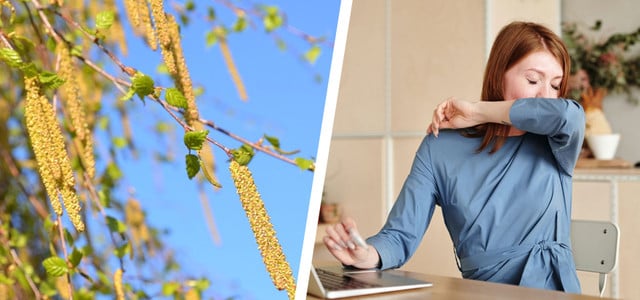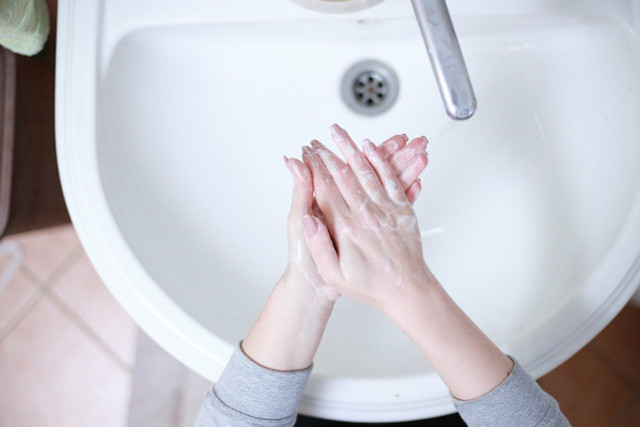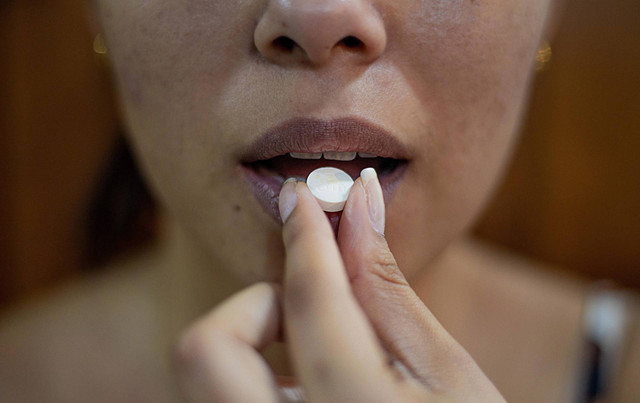
Finally spring, finally blooming flowers and bushes – hello! In spring, allergy sufferers suffer particularly badly. But are allergy tablets a reliable help against hay fever, or are home remedies like a steam bath better? Neither, say two dermatologists.
When crocuses, daffodils and tulips sprout from the ground and trees and shrubs begin to bloom, it is finally spring again. As pleasant as the spring sun warms, allergy sufferers are now increasingly struggling with itchy eyes and a runny nose. At the same time, more and more people are suffering from hay fever. We explain why this is so and how to effectively combat pollen allergy.
According to the pollen count calendar, the main flowering period for the early bloomers hazel and alder will soon be over; Birch, beech, ash, hornbeam, poplar and willow now distribute their pollen in the air. A little later in the spring, the grasses follow and begin to bloom. But why exactly do many people react allergic to pollen?
Hay fever: What actually is a pollen allergy?
Itchy eyes, sneezing attacks and a runny nose – those affected can usually describe the typical symptoms of hay fever well. Not everyone knows why the body reacts sensitively to pollen from flowers and grasses.
The problem with a pollen allergy: the body classifies the pollen as a danger and the immune system reacts accordingly. If pollen gets on the mucous membranes, antibodies are formed as well as against pathogens – although the pollen is actually harmless. This hypersensitive reaction of the body leads to symptoms such as watery eyes, sneezing, scratchy palate and itchy skin.
Allergy researcher: hay fever in Germany one of the “most common chronic diseases”
Hay fever has been increasing for years: Between April 2019 and September 2020, a total of 34.7 percent of the women and 27 percent of the men surveyed said they suffered from an allergy to the Robert Koch Institute (RKI).
Torsten Zuberbier, Professor of Allergology and Director of the Institute for Allergy Research at the Berlin Charité, said in an interview with Der Spiegel that allergic diseases had leveled off at a very high level. According to the allergist, allergies are “one of the most common chronic diseases in countries like Germany”. In addition, the severity of allergies would increase, as would cross-allergies with certain foods.
Air pollution and strict hygiene promote hay fever
Why is it that allergies are increasing and appearing more severely? Two main reasons are air pollution and good hygiene. But climate change is also increasing allergies.
Allergist Zuberbier explains that air pollution causes pollen to irritate our mucous membranes more. This increases the likelihood of developing an allergy. Knut Brockow, Senior Physician in the Allergy Department of the Clinic for Dermatology and Allergology (Klinikum rechts der Isar) in Munich, also sees the particulate matter pollution in the air from cars with combustion engines as the reason for the increasing number of allergy cases.
The doctor explains to Focus that city dwellers are particularly at risk: “Anyone who lives on a busy street has a higher risk than in a neighborhood with little traffic.”

Both physicians also identify the good hygiene situation in countries like Germany as the cause of the increased cases of allergy. Today we rarely come into contact with bacteria and parasites. Whereas the immune system used to have to fight harder against pathogens, it is now also directed against harmless pollen.
Climate change extends suffering for allergy sufferers
Due to the climate crisis and rising temperatures, plants are blooming earlier and sometimes longer. This season, hazelnut bushes and alder started pollen count in December and January. Experts blame climate change for the postponement of the flowering period. If the first pollen begins to fly in winter, this prolongs the suffering for many allergy sufferers.
Only a medical diagnosis brings certainty – and remedies
As hay fever increases, so does the demand for effective antidotes. According to Anja Schwalfenberg from the German Allergy and Asthma Association, the most important thing is a medical diagnosis. “The pollen allergy can intensify – it can even result in allergic asthma,” Schwalfenberg knows. In medicine, this is called a so-called “floor change”.
Allergists can carry out an allergy test and diagnose a pollen allergy, and dermatologists, ENT specialists and pulmonologists often have additional qualifications. The diagnosis is not only important to prevent a floor change, but also to know exactly which pollen you are allergic to. The doctor can then decide which drugs will best relieve the symptoms and whether specific immunotherapy is possible and useful.
Prof. Zuberbier is also critical of the fact that many people try to get their pollen allergy under control on their own. In his opinion, hay fever is too often trivialized and not treated properly. However, the expert says: “But nobody has to endure these complaints.”
Cure hay fever: Only possible with immunotherapy
While antihistamines and home remedies can alleviate hay fever symptoms (more on that below), they don’t address the root cause. This can only be achieved with a specific immunotherapy, explains Regina Fölster-Holst, senior physician in dermatology on the Kiel campus of the Schleswig-Holstein University Hospital.
With this therapy, “the immune system is outwitted by administering a very, very, very small amount of the allergen to the patient, which is then slowly but surely increased,” says Fölster-Holst. The treatment lasts at least three years. According to the senior physician, five years of immunotherapy is better.
Only after this time did the immune system get used to the allergen and no longer see it as a danger. According to Regina Fölster-Holst, the symptoms usually improve afterwards and: “A specific immunotherapy prevents other allergens from occurring and a change of level – such as asthma – from developing.”
Allergist Knut Brockow also considers hyposensitization to be useful. “These therapies are very effective, especially if the allergy has only one trigger, such as grass pollen, but they are also used far too rarely.” In his estimation, neither the patient nor the family doctor know about the treatment too often.
Antihistamines, nasal spray, steam bath – the range of allergy medication is large
If immunotherapy is not an option, medicines and home remedies can at least provide relief and combat the annoying symptoms. We present the most well-known medications – including medical assessments by experts.
Antihistamines for hay fever
Antihistamines come in the form of pills, eye drops, or nasal sprays. The agents prevent an allergic reaction in the body by blocking the receptors of the messenger substance histamine.
The active ingredients cetirizine and loratadine can be bought over the counter in pharmacies. However, cetirizine in particular is said to make you tired. This statement is now outdated because there are second-generation antihistamines on the market. “They make you less tired than the first generation,” says doctor Regina Fölster-Holst.

The dermatologist advises taking the medication as a precaution and not only when symptoms such as watery eyes and a runny nose are already noticeable. Also, take the antihistamines consistently for three or four weeks during the allergen’s heyday. “Sometimes take, sometimes not – that’s no use,” was the verdict of Fölster-Holst.
Cortisone medication for pollen allergies
However, antihistamines are not always enough to effectively alleviate allergy symptoms. Then cortisone sprays or eye drops can help. “Cortisone reduces inflammation. Because every allergy is an inflammatory process,” explains Fölster-Holst.
Allergy researcher Zuberbier told Spiegel: “Modern cortisone derivatives, which are used as a nasal spray, only have a local effect and no longer get into the blood. They offer a very good safety profile.”
Nevertheless, cortisone does not have a good reputation in the general population. “The prescription of corticosteroids as a nasal spray is far too rare for hay fever,” complains allergist Knut Brockow. The active ingredient is very useful for pollen allergies because it has a positive effect on the inflammation.
Home remedies for hay fever
Simple home remedies can also alleviate the symptoms of hay fever. We have put together the most important ones for you: Hay fever: Effective home remedies for stuffy nose and itchy eyes
But while a steam bath is soothing and tea soothes a sore throat, you’re only treating the symptoms, not the cause. You should therefore still have an allergy test done and clarify with a doctor which medication makes the most sense.
Important measures against hay fever
You can take the following precautions so that the pollen allergy does not bother you too much:
- Wear a scarf or cap on your head. Pollen easily gets caught in the hair. Positive side effect: You are better protected from the sun.
- As soon as you get home, wash your hands, arms, and face to remove pollen.
- Change clothes at home, or at least don’t take off your clothes in the bedroom.
- Comb out your hair before changing clothes.
- It is best to shower before going to bed.
- Wash your hair frequently, possibly even daily.
- Clean your living area regularly – we recommend environmentally friendly home remedies.
- Attach pollen screens to the windows. Since the material is dense, you should air it out longer to achieve good air exchange.
You can’t completely avoid pollen. Even if windows and doors are largely closed, the particles can penetrate into the apartment. “Even if you lock yourself in the basement, small pollen would probably still fly in through the cracks in the window,” was the verdict of Prof. Regina Fölster-Holst.
But you can keep an eye on the pollen count – with the pollen count app or with many weather services. If a heavy pollen count is forecast, you can at least plan accordingly and not exercise or have lunch outside.
With material from the dpa
Read more on Techzle.com:
- Sunscreen test at Stiftung Warentest: 9 test winners
- Ticks: how to remove them and protect yourself from bites
- Barefoot shoes: Four recommended & sustainable brands